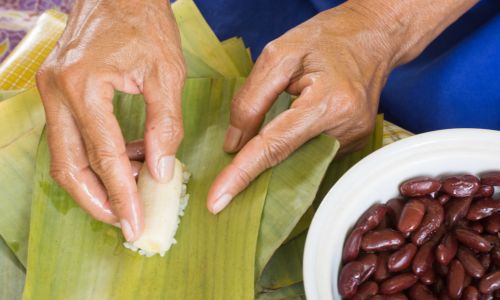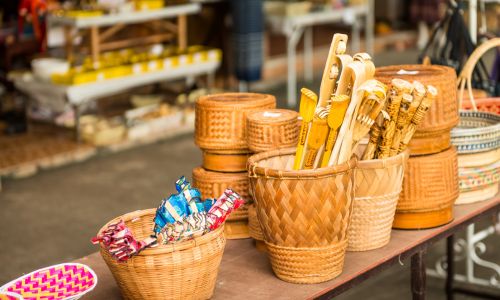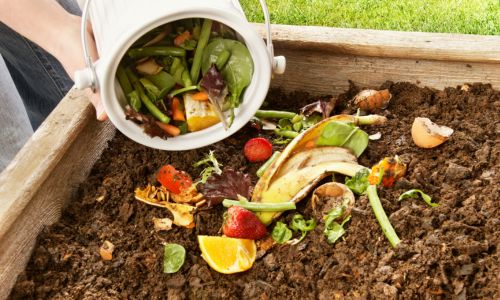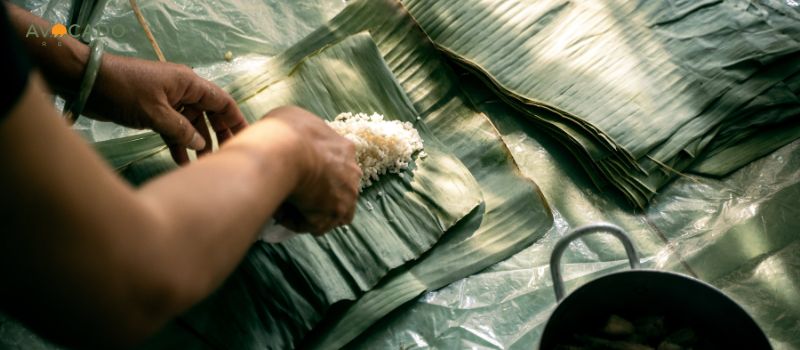Bali is more than a tropical paradise of beaches and temples it is also a living classroom for sustainability.
Rooted in the island’s Tri Hita Karana philosophy harmony with nature, people, and the divine Balinese daily life offers countless lessons on how to live lightly on the planet.
One of the best ways to embrace this wisdom is by transforming your kitchen into a space that reflects eco-conscious values.
Whether you are staying in a villa in Pemuteran, cooking at an eco-lodge near the West Bali National Park, or simply bringing a touch of Bali into your home abroad, these eight sustainable swaps will help you reduce waste, support local farmers, and enjoy food in a more mindful way.
1. Swap Plastic Wrap for Banana Leaves

In many Balinese kitchens, plastic wrap is almost unnecessary. Banana leaves, sold in traditional markets for just IDR 5,000–10,000 per bundle, serve as nature’s original packaging.
They are biodegradable, add a subtle aroma to foods, and support local farmers who grow banana plants alongside rice fields.
In Bali, dishes like pepes ikan (steamed fish parcels) or pepes jamur (mushroom parcels) are wrapped in banana leaves before steaming or grilling.
At home, you can use them to cover leftovers, wrap rice or tempeh, or steam vegetables. Simply rinse the leaves before use, cut into squares, and secure with bamboo skewers. Afterward, they can go straight into the compost.
Educational insight: By replacing plastic wrap, you not only reduce single-use waste but also keep alive an age-old culinary tradition that celebrates natural abundance.
2. Replace Disposable Containers with Bamboo Baskets

Instead of plastic storage boxes, consider bamboo baskets woven by Balinese artisans and widely available in markets across West Bali.
These baskets, priced between IDR 20,000–50,000, are reusable, breathable, and add rustic charm to your kitchen.
Balinese families often use them to store rice, mung beans, or fresh vegetables like kangkung (water spinach). For longer freshness, line them with cloth to keep greens hydrated in Bali’s humid climate.
Why it matters: Each purchase supports local craftspeople, reduces reliance on imported plastic goods, and strengthens Bali’s sustainable economy.
3. Switch to Coconut Oil Instead of Processed Cooking Oils

Palm oil and refined cooking oils are common worldwide, but they carry a heavy environmental footprint. In contrast, coconut oil abundant in West Bali is a healthier and more sustainable choice.
Cold-pressed coconut oil, usually sold in glass jars, is versatile for frying, sautéing, and even baking. It contains healthy fats that provide energy for Bali’s active lifestyle, whether hiking in Jembrana or snorkeling in Menjangan.
Practical tip: Look for unrefined coconut oil for a nutty flavor that enhances Balinese classics like sayur lodeh. By choosing coconut oil, you not only improve your health but also support small-scale farmers who process coconuts sustainably.
4. Use Fresh Spices Over Packaged Seasonings

Balinese cuisine is renowned for its bumbu Bali (spice paste), a fragrant blend of turmeric, galangal, lemongrass, and chilies. These spices, purchased fresh from local markets, replace the need for processed, plastic-packaged seasonings.
Fresh turmeric, for example, is anti-inflammatory and can be grated into soups or smoothies. Lemongrass adds both aroma and antibacterial benefits. By making your own spice paste, you get better flavor, more nutrients, and zero packaging waste.
Educational insight: Buying fresh spices supports Bali’s farming communities and keeps alive culinary knowledge passed down for generations.
5. Choose Reusable Cloth Bags Over Plastic Produce Bags

Shopping at Bali’s vibrant markets is a feast for the senses but it also generates a lot of plastic waste if you rely on disposable produce bags. The solution is simple: reusable cloth bags.
Often handmade from cotton or recycled fabrics, these bags (IDR 15,000–30,000 each) are durable, washable, and perfect for carrying papayas, dragon fruit, or bundles of greens.
Keep a few folded in your bag so you’re always ready for spontaneous market visits in Gilimanuk or Pemuteran.
Why it matters: Small actions like this align with Bali’s zero-waste initiatives and help keep beaches, forests, and coral reefs free of plastic pollution.
6. Opt for Local Tempeh Instead of Imported Meat

Tempeh, a traditional Indonesian superfood made from fermented soybeans, is not only rich in protein (19g per 100g) but also environmentally friendly.
Unlike imported beef or chicken, tempeh has a lower carbon footprint and is sold in biodegradable banana leaf packaging.
In West Bali, fresh tempeh costs around IDR 10,000–15,000 and is often prepared in dishes like tempeh goreng or added to nasi campur. Its probiotics also support gut health, making it ideal for travelers seeking balanced nutrition.
Educational insight: By choosing tempeh over meat, you directly reduce greenhouse gas emissions while supporting local food traditions.
7. Replace Bottled Drinks with Homemade Jamu

Instead of buying bottled sodas or juices, embrace Bali’s heritage of herbal tonics. Jamu kunyit asam (turmeric-tamarind drink) is a classic recipe that combines anti-inflammatory turmeric with digestion-friendly tamarind.
Making jamu at home is easy: grate fresh turmeric, mix with tamarind paste, add palm sugar, and dilute with water. Store in reusable glass bottles, chill, and enjoy. This habit reduces plastic waste while boosting your immune system.
Cultural note: Jamu is more than a drink it’s a wellness ritual rooted in Balinese daily life, often prepared fresh each morning.
8. Compost Food Scraps Instead of Throwing Them Away

In Bali’s farming villages, food scraps are rarely wasted. Instead, they are composted and returned to the soil, enriching rice paddies and vegetable gardens.
You can adopt the same practice at home by collecting fruit peels, vegetable trimmings, and coffee grounds in a compost bin. Mix with dry leaves to accelerate decomposition.
If space is limited, check for community composting initiatives many eco-lodges and organic farms in Bali offer this service.
Why it matters: Composting reduces methane emissions from landfills and supports a circular economy, turning waste into a valuable resource.
Embracing Eco-Friendly Living, the Balinese Way
Bali’s eco-conscious ethos is not just about protecting the environment it’s about living in harmony with it.
By integrating these eight sustainable kitchen swaps, you can reduce waste, support local communities, and celebrate the island’s culinary wisdom.
From banana leaves to jamu, each choice connects you more deeply to Bali’s traditions while offering practical solutions for a greener future.
And if you’d like to experience these ideas firsthand, visit AVOCADO RESTO in West Bali, where plant-based menus feature tempeh, turmeric, and seasonal fruits all served in eco-conscious ways that embody Bali’s sustainable spirit.
